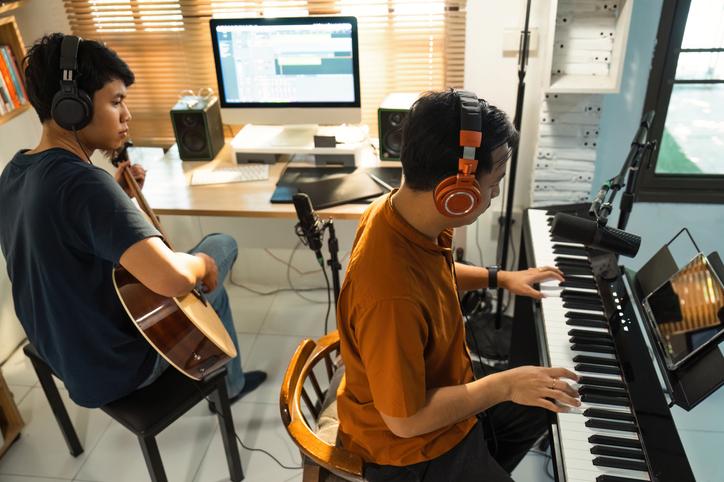
Using partnerships to establish and build on project success
From listening to the student voice to creating joined-up partnerships, success on major capital works depends on teamwork. Here, Dominic Wood outlines key elements to ensure project delivery and reap long-term benefits

You may also like
It was the student voice that provided the impetus for the initial scoping of a £6.45 million decarbonisation project at the Royal Northern College of Music (RNCM). The conservatoire’s climate action group approached members of the executive team to ask the institution to declare a climate emergency – and we could not in all conscience do so without being able to say we were doing all we could to address it on an institutional level.
So, the inciting relationship for the programme was the one between the RNCM and its students. Then, other robust partnerships were essential in delivering this ambitious work while keeping the institution fully open and accessible to students 18 hours per day, seven days per week.
- A digital boost to music teaching and performance
- How to use campus design to nurture a culture of belonging
- A whole-university road map to sustainability impact
The result was that in 2021-22, through the Greater Manchester Combined Authority (GMCA) public sector decarbonisation scheme (and funded by Salix), the RNCM delivered a programme of works to decarbonise our building and radically reduce our carbon impact via the delivery of a full building retrofit, which was to include:
- full roof replacement and cavity wall insulation to improve thermal efficiency
- a new building energy management system
- four-pipe hybrid air source heat pump solution
- high-efficiency replacement chiller
- replacement pumps and motors
- solar photovoltaics
- smart metering
- significant upgrades to electrical infrastructure
- replacement transformer and
- 1 megawatt of battery storage.
Build partnerships that tie funding to delivery
The process of securing significant programme funding from Salix was complex, for which a strong, joined-up partnership was critical to its success; going it alone was not an option. In particular, clearly defined links with GMCA’s low-carbon team were essential in providing guarantees to Salix that we could demonstrate strong feasibility and meet tight deadlines, as well as a clear idea of what the carbon outcomes related to their funding would be at a subregional level.
At a time when other programme partners were forced to return money to Salix as their projects proved undeliverable, the RNCM’s ability to react quickly to additional opportunities helped us to demonstrate that we were able to spend their money considerately and effectively.
Move quickly, keep an open mind, think critically
Once funding was secured from Salix, the deadline imposed by the scheme meant that we had to mobilise the project team and associated contractors very quickly. The creation of a cohesive, open-minded project team (see Additional Links) was crucial to the project’s development and delivery. The team fostered a critical-thinking culture where nothing was off the table and “no ideas are stupid”, necessitated by the need to deliver an ambitious and complex programme of works in a live academic facility.
Detailed programming between the RNCM and its contractors was required to keep activity to a schedule that minimised disruption and noise within a live music-teaching environment. The project team used granular detail of what learning, teaching and performing activity was booked, where and when, resulting in an unconventional delivery pattern that included extensive out-of-hours and overnight work.
Use measurable success to catalyse change
The success of the project partnership is evident in the delivery of the works and the results: the works will save an estimated 389 tonnes of carbon annually, lowering our on-site gas usage by 41 per cent. Current data shows in-year kWh savings for on-site gas use have already exceeded 50 per cent.
The RNCM has retained the same project team for its next major capital project, to redevelop our library, again with the aim of securing Salix funding. Salix is increasingly looking for evidence-based research and evaluation in funding proposals; the experience and track record of delivery of the RNCM’s robust partnership places us in a strong position to maintain this funding relationship.
The project has been a catalyst for change across the RNCM:
- By listening to the student voice at all levels of the institution, up to the principal, we put into action a cohesive programme that produced demonstrable results and led to the RNCM declaring a climate emergency as requested by our students.
- The conservatoire’s board and finance committee are fully aware of the needs, opportunities and benefits of decarbonisation and other sustainability programmes, which is reflected in a new performance and programme theme for 2023-24, The Future Is Green.
Finally, we hope to use networks and partnerships to inform the wider higher education sector’s activity addressing the climate emergency. As chair of Conservatoires UK, RNCM principal Linda Merrick has presided over the establishment of a new environmental forum to develop and share best practice across the sector, and we hope other conservatoires and HE institutions can learn from our experience. The approaches we have taken, through the partnerships we have developed, are replicable by other institutions, whatever sector they operate in.
Dominic Wood is head of environment and facilities at the Royal Northern College of Music.
The Royal Northern College of Music decarbonisation scheme has been shortlisted for Outstanding Contribution to Environmental Leadership in the Times Higher Education Awards 2023 #THEAwards. Click here for a full list of shortlisted candidates.
Academics and university leaders from across the UK and Ireland will come together on 6-7 December at THE Campus Live UK&IE to talk about institutional strategies, teaching and learning, the student experience and more. Join us for this two-day event in Liverpool.
If you would like advice and insight from academics and university staff delivered direct to your inbox each week, sign up for the Campus newsletter.
Additional Links
The project team comprised lead sustainability adviser Twelvetrees Consulting with project management support from 2 Degrees; CDM support from DM Safety and Health Services Ltd; M&E design input from consulting engineers DSSR and Hysopt; architectural design services by Ian Palmer Architects; structural design services by Ridge and Partners LLP; procurement support from Tenet Educational Services; and QS support from Appleyard and Trew. The project was delivered with main contractors including Dodd Group (M&E), Schneider Electric, NRG Illumination and DNO Partners Electricity Northwest.


